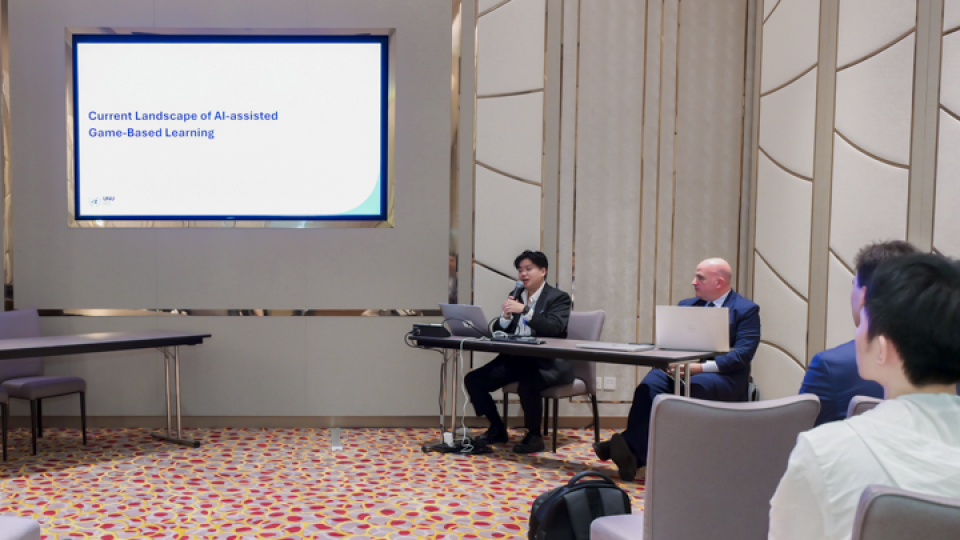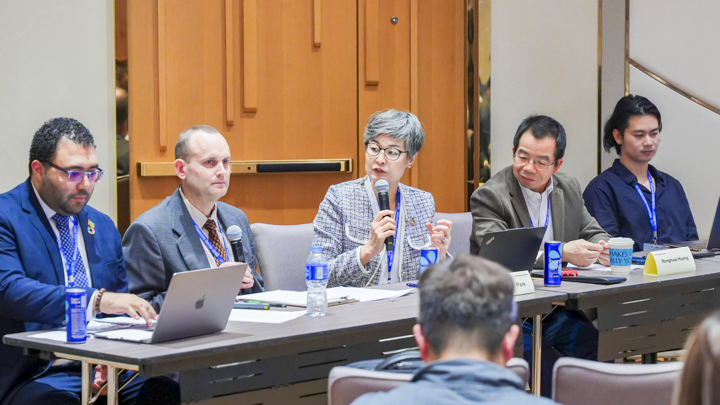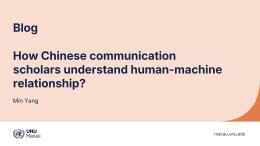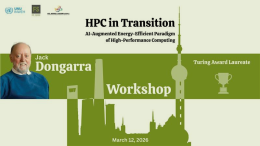On 23–25 October 2025, UNU-IAS contributed to the UNU Macau AI Conference 2025 held in Macau SAR China on the theme “AI for Humanity: Building an Equitable Digital Future.” UNU-IAS experts led and participated in multiple sessions on the transformative potential of artificial intelligence (AI) in higher education research and governance, and joined the UNU AI Working Group, which convened representatives from several UNU institutes to share AI-related initiatives and explore collaborative pathways.
Jerome Silla (Research Associate, UNU-IAS) presented on UNU-IAS activities as part of the Action Group on the Futures of Higher Education and Artificial Intelligence, under the United Nations Higher Education Sustainability Initiative (UN HESI), including a podcast, webinar series, policy briefs and global dialogues on AI literacy. Giselle Miole (JSPS-UNU Postdoctoral Fellow, UNU-IAS) shared a policy case study on “Leveraging AI through Simulation Games for Teaching Climate Change Literacy", identifying key recommendations on building inclusive infrastructure, empowering educators, promoting inclusive AI research, incentivizing public-private partnerships, and establishing robust monitoring and evaluation frameworks.

UNU-IAS organized a roundtable session on inclusive strategies for AI integration and regional differences in adoption. Chaired by Jonghwi Park (Academic Programme Officer and Head of Innovation and Education, UNU-IAS), the session highlighted the challenges and opportunities faced by institutions in the Global South. Ronghuai Huang (Dean of Smart Learning Institute, Beijing Normal University; UNESCO Chair on AI in Education), examined strategies for upskilling educators in remote and underserved areas to effectively use generative AI tools in teaching and learning. Jim Staihar (Executive Director, NYSTEC Business Center of Excellence, SUNY Polytechnic Institute) explored inclusive approaches to AI-driven research and academic integrity. Doug Specht (Head of School of Media and Communication, University of Westminster) discussed sustainable and practical strategies for university leadership in a rapidly changing world. João Filipe Papel (JSPS-UNU Postdoctoral Fellow, UNU-IAS) synthesized key themes and reflected on the constraints of adapting AI strategies in the Global South.
UNU-IAS attended the UNU Macau AI Education Day, which featured the flagship session “GenAI & Higher Education High-Level Panel” on the transformative role of generative AI in shaping the future of academia, opportunities for innovation and the need for ethical governance and institutional readiness. UNU-IAS also participated in the UNU Global AI Network Board Meeting, where members discussed future collaborative mechanisms to address global challenges in AI development, education and policy coordination.
The UNU Macau AI Conference was organized by UNU Macau as part of the UNU Milestone Series commemorating the 80th anniversary of the United Nations and the 50th anniversary of the United Nations University. The conference brought together policymakers, researchers and practitioners from across sectors to explore how AI can accelerate progress towards the SDGs while ensuring ethical, inclusive and human-centered development.





